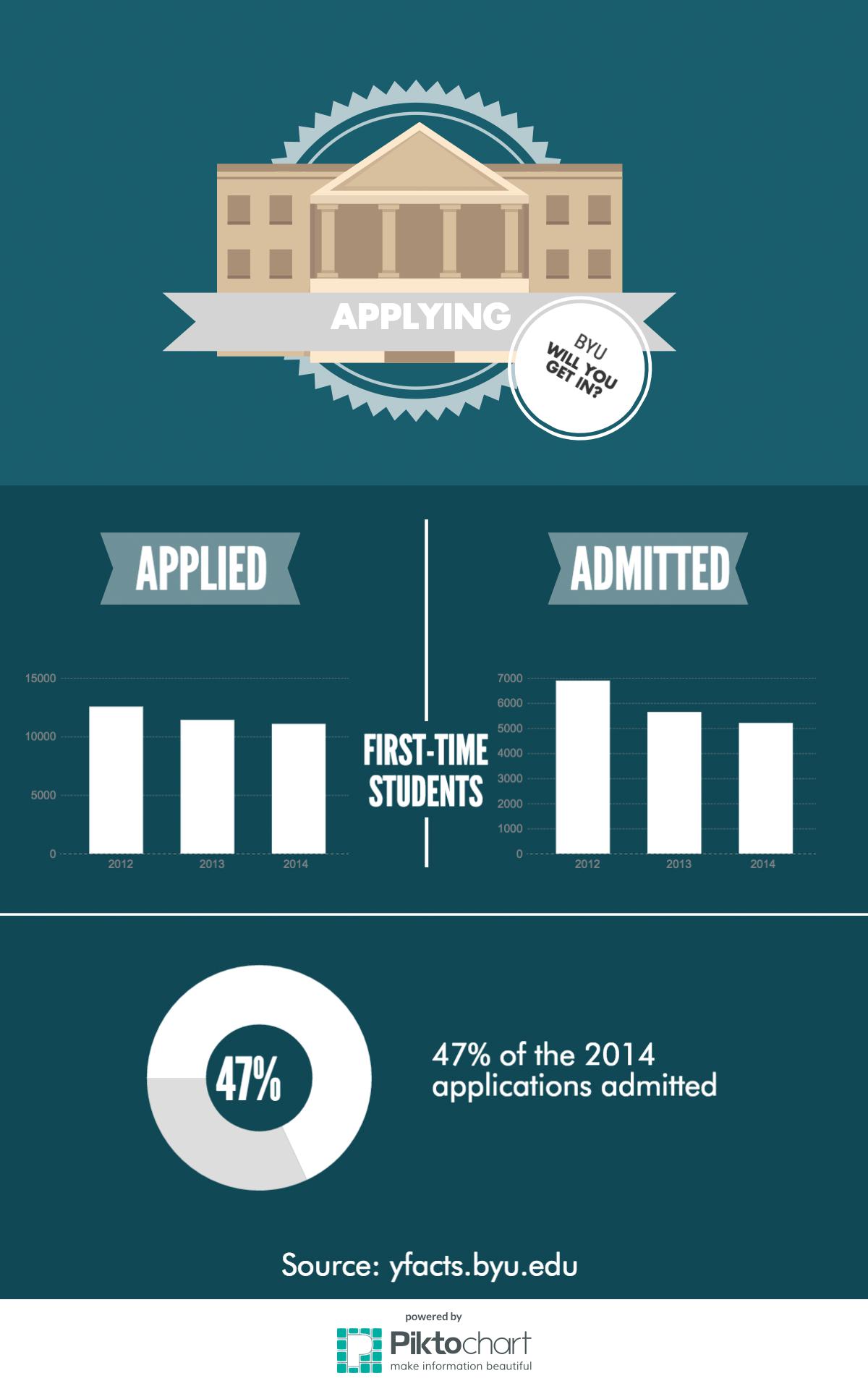
Applications for Fall 2016 are in and aspiring BYU students will begin to find out if their extra efforts were enough. College applications have been the focus for most potential BYU students. Family, friends and school advisers have most likely bombarded them with the “how-to-get-into BYU list,” but the list may be rumors instead of factual advice.
Amanda Ayre, a sophomore studying business, said she was emotional when she found out she was accepted into BYU.
“I wasn’t sure if I would get in,” Ayre said. “It wasn’t natural for me that I was going to get in. I purposely took AP classes so that it would look good on BYU’s transcript and took an ACT class to prepare me. I had to work really hard.”
Grades, ACT scores, Advanced Placement (AP) classes, extra-curricular activities and seminary graduations are among the list of “should do’s” that potential students refer to as their key to get into BYU.
However, despite the hard work, there is no guarantee that admission will be granted. Among the stress of applying for higher education, BYU students-to-be are also plagued with the fears that could keep them from becoming a Cougar.
Taylor Zundel, a junior at BYU, said she was nervous she wouldn’t be accepted when she was applying.
“I had heard rumors that if you lived in Utah it was harder to get in,” Zundel said. “I felt like my grades and ACT scores were just average for BYU, so I was nervous I wouldn’t get in.”
Students seem to agree there are many ideas and rumors that circulate about BYU admissions, how it works and what exactly can get them into BYU.
Rumor #1: Applying for Summer Term increases a student’s chances of getting into BYU.
False.
Applying for summer does not increase a student’s chances of being accepted. Todd Hollingshead, BYU media relations manager, said all admissions are done equally. The same criteria and methods used to accept students into Fall Semester are used in Summer Term as well. However, students who are accepted and attend Summer Term will be considered first for fall on-campus housing accommodations and class registration.
Rumor #2: You must meet a certain ACT score to be admitted into BYU.
False.
While the average ACT score for freshmen students last year was 28.95, there is not a minimum score requirement. The ACT score is part of the student’s overall academic record. This record also includes the student’s high school GPA which is considered “the foundation and central focus of admission decisions,” according to the BYU admissions website.
The admissions website stated “BYU is looking for students who are accomplished in a variety of areas — not just academics.” Hollingshead recalled sessions where he has seen the admissions counselors discuss students who were accepted that had lower ACT scores but a better overall application for the university.
Rumor #3: The essays are the most important part of the application.
Half-true.
The entire application is important, but when it comes to setting individual students apart from the competitive numbers, the essays carry a lot of weight in acceptance consideration.
Hollingshead said students who are applying to BYU are very competitive.
“They’re all extremely excellent in academics and have extra-curricular activities that they’re involved in,” Hollingshead said. “When you look at yourself in comparison to other high school students maybe you’re right at the top, but for applicants at BYU, you’re all right at the top.”
The National Association for College Admission Counseling’s 2011 State of College Admission report showed private colleges assigned greater importance to essays and writing than public colleges did.
“Trying to separate yourself is really the challenge and that’s why essays can be important,” Hollingshead said.
Rumor #4: It’s harder to get into BYU now than it was a couple of years ago.
Half-true.
About 50 percent of applicants were accepted in 2015 — that is higher than the percentage of students accepted in both 2013 and 2014. However, according to the National Association for College Admission Counseling, “the national average acceptance rate had been decreasing slightly, from 69.6 percent in 2003 to 63.9 percent in 2013.” The association also included that institutions are considered to be most selective if they accept less than 50 percent of applicants.
Rumor #5: If students didn’t go to seminary, they can’t get in.
False.
Seminary graduation could improve a student’s chances of being accepted, but it is not necessary. In 2015, 96.2 percent of students who were accepted into BYU had graduated from the four-year seminary program according to the BYU Admissions website. The Admissions Council considers the ecclesiastical endorsement and then academic records. Then each application is evaluated according to seminary attendance, service, leadership, personal essays, individual talents, creativity, AP/IB courses taken and unique or special circumstances, as well as other factors that enhance the individual’s application to BYU.
Rumor #6: If students live in Utah, their chances of getting in are lower.
False.
Based on an answer on the BYU admissions website to this question, “there are no quotas for any race, religion, country of origin, state of origin or any other demographic. The only limitation is the overall number of students we are able to admit each semester.”




